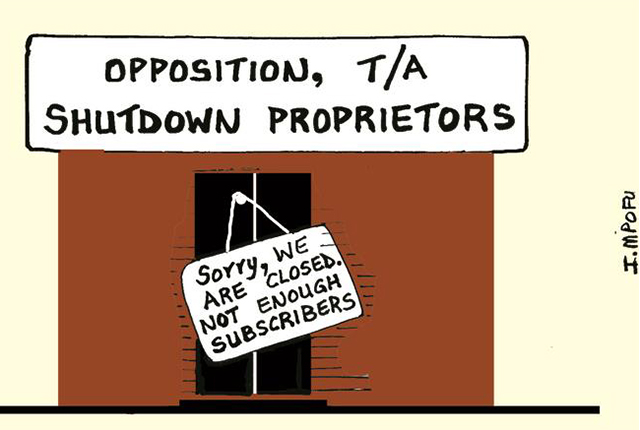Editorial Comment : Time to set rules for real demos

 NOW that Government has given us a respite from demonstrations in and around Harare for the next fortnight, we need to learn the lessons of the riotous mess we saw twice in central Harare last week and draw up an agreed code of conduct for future demonstrations that permits genuine protesters the constitutional right to protest, allow the overwhelming majority to carry on with their normal activities and prevent thugs and criminals from exploiting the law for their own unpleasant ends.
NOW that Government has given us a respite from demonstrations in and around Harare for the next fortnight, we need to learn the lessons of the riotous mess we saw twice in central Harare last week and draw up an agreed code of conduct for future demonstrations that permits genuine protesters the constitutional right to protest, allow the overwhelming majority to carry on with their normal activities and prevent thugs and criminals from exploiting the law for their own unpleasant ends.
Orderly marches are not that difficult to organise and any group that cannot perform the simple operation and cannot control its followers should be barred from marching until it proves it can.
There needs to be a definite leader of the organisers, a chief marshal who is someone who everyone marching will obey without quibbling and that chief marshal needs to be in continuous contact with a reasonably senior police officer appointed for liaison and traffic control.
Experience suggests that marchers need, before the start, to be divided into groups of around 100 each under an appointed marshal with every 10 or so groups under a super-marshal who is in direct contact with the main organiser, the chief marshal. Marshals and super-marshals need precise instructions from the chief marshal and preferably some basic training. The main point is that the marchers need to be organised and under the control of the organisers.
The route needs to be agreed in advance and sensible and rational rules, ones that can be applied to all demonstrations, hammered out well in advance so that all involved know the position. As has been pointed out, while marchers can perhaps concentrate on open land on the outskirts of the Central Business District of Harare or any other city, they cannot concentrate in the middle of the CBD to the detriment of others. They need to be strung out on the march.
And that strung out march needs its gaps, so that traffic can flow; marchers should not block pavements or roads. Allocating a single lane of a road seems an acceptable compromise, allowing others to carry on with their normal activities on the rest of the road and on the pavements.
Organisers of demonstrations need to understand that a lot of people simply do not care what they are marching for and quite a few will be opposed to their particular views. Many who they march past have their own affairs and own business to attend to. So they need to be able to ensure that their supporters understand these points and do not harass anyone.
Marshals should be duty bound to report outsiders joining the march since these people have not been vetted, have not received the instructions and may well be up to no-good.
While the police must obviously be prepared for any breakdown of order, they should also try and work with the chief marshal to prevent such a breakdown in the first place.
It has become apparent that both the police and demonstration organisers have access to good legal advice and perhaps reasonable and sensible rules can be negotiated with these lawyers present, people highly trained to find solutions in civil disputes and sworn to uphold all law, both the right to legal protest and the right of everyone else to go about their legal business without fear of violence and fear of harassment.
Suggestions have been made that demonstration organisers may have to accept civil liability for criminal actions of those who claim to follow them. That needs to be explored to stress the responsibilities organisers of legal marches must accept, along with carefully worded clauses of what happens when organisers take all reasonable precautions and something untoward happens.
Zimbabweans are fairly sensible. Most want little to do with political grandstanding although they turn out in their millions every five years to vote, since they know that in a democracy this is when their voices really count.
That general sense needs to percolate through to political leaders and their advisers.









Comments